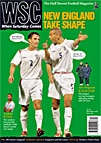 The FA's reaction to the Burns Report
The FA's reaction to the Burns Report
Several mysterious half-seen creatures are said to exist in the UK. There’s the Beast of Bodmin, a giant cat that’s held responsible for the death of livestock in south-west England. The Loch Ness monster lurks in various hazy photographs, lovingly reproduced on early-hours TV documentaries. And, perhaps the most spectral of all, there’s Geoff Thompson. He’s a bearded man in late middle age, occasionally sighted getting in and out of taxis, and is said by some to be the chairman of the FA. Many doubted his existence, but suddenly at the end of October 2006 he both appeared in full public view and made a useful contribution to an important matter. Thompson voted to abolish his own post, one in a series of measures for reforming the FA proposed by the Burns Report.
This review, commissioned in August 2005, made 16 recommendations, which were agreed upon by a slim majority of the 75 members of the FA Council (comprising the heads of county FAs plus delegates from the professional clubs). Among the measures are the expansion of the FA Council to include fans, players, managers and representatives of ethnic minorities, and the creation of a semi-independent compliance unit, to make a clear distinction between those doing the prosecuting and those passing judgment. Most important, from 2008 the FA will be led by an independent chairman appointed from outside the game.
Thompson’s vote in favour proved vital, as that measure was carried by a majority of just two. Had he voted against it would have been deadlocked. Instead there are even reports that he will stand down early, to hasten the introduction of the appointment of a figure from business or politics to run the FA.
There is a fundamental problem with running football. You want people who are not beholden to vested interests or allegiance to clubs. But you want people who are interested in football. The BBC have a similar conundrum when choosing political interviewers – you need someone with a strong interest in politics but no opinions of their own.
By itself, the appointment of an independent FA chairman will solve little. Adam Crozier was a figure from outside football who became chief executive; Mark Palios’s standing in the world of accountancy, rather than his games for Tranmere aeons ago, got him that job. But generally there seems to be a turning of the tide at a level above football. The new FA chairman may well be in a position to challenge the power of the elite clubs, who have been encroaching ever further in the past two decades.
Lord Burns is a serious figure, a report specialist. A former permanent secretary to the Treasury (Sir Humphrey for Gordon Brown), in previous reports he’s recommended the abolition of the BBC governors and investigated hunting. His report on the FA was commissioned by a government that had lost patience after a succession of comical incidents, from the Wembley farce to Faria Alam. The botched appointment of a successor to Sven-Göran Eriksson this year can only have ensured strong backing from Sports Minister Richard Caborn for Burns’s findings. The bungled approach to Luiz Felipe Scolari was a powerful argument for change.
Meanwhile, it looks as if European Union governments are willing to act on their agreement of six years ago, made in Nice, that sport should not be treated like any other form of business. As we report elsewhere in this issue, the G-14 appear to be aware of this. If the game’s governing bodies are free to act for the benefit of the sport as a whole – at national, European and world level – without worrying about legal action from those seeking to take money out of the game or control it for their own interests, then this will be to the good. Another of Burns’s recommendations was the creation of a slimmed-down FA board, with two independent directors – like the appointment of an outside chairman, a measure that will diminish the power of the big clubs.
It may not work. The candidates for the independent posts may not be of sufficient calibre. They may be overwhelmed by pressure from the media, who will remain in thrall to the richest clubs. But at least there’s more chance of it working than of the Loch Ness monster winning Mastermind.
From WSC 238 December 2006. What was happening this month